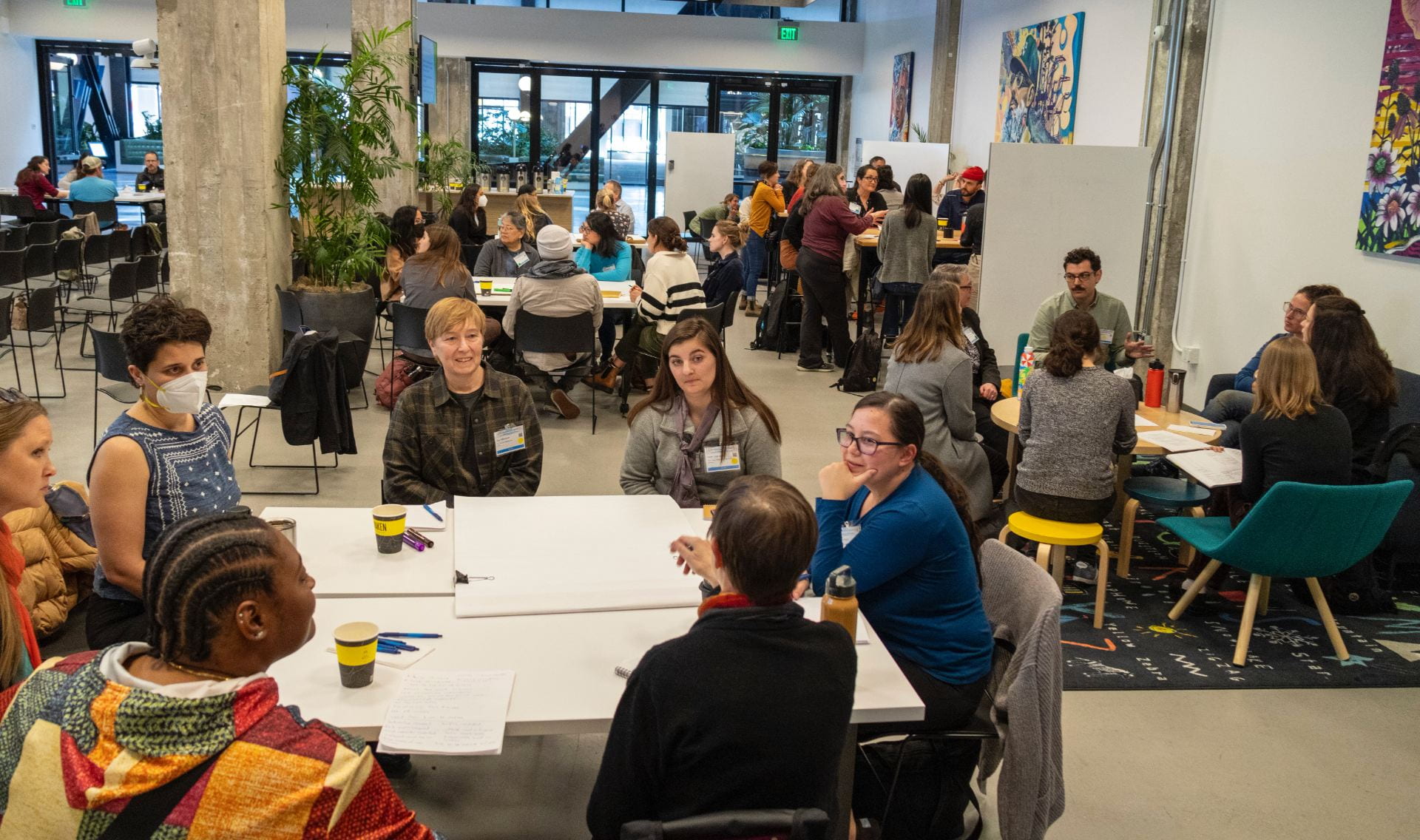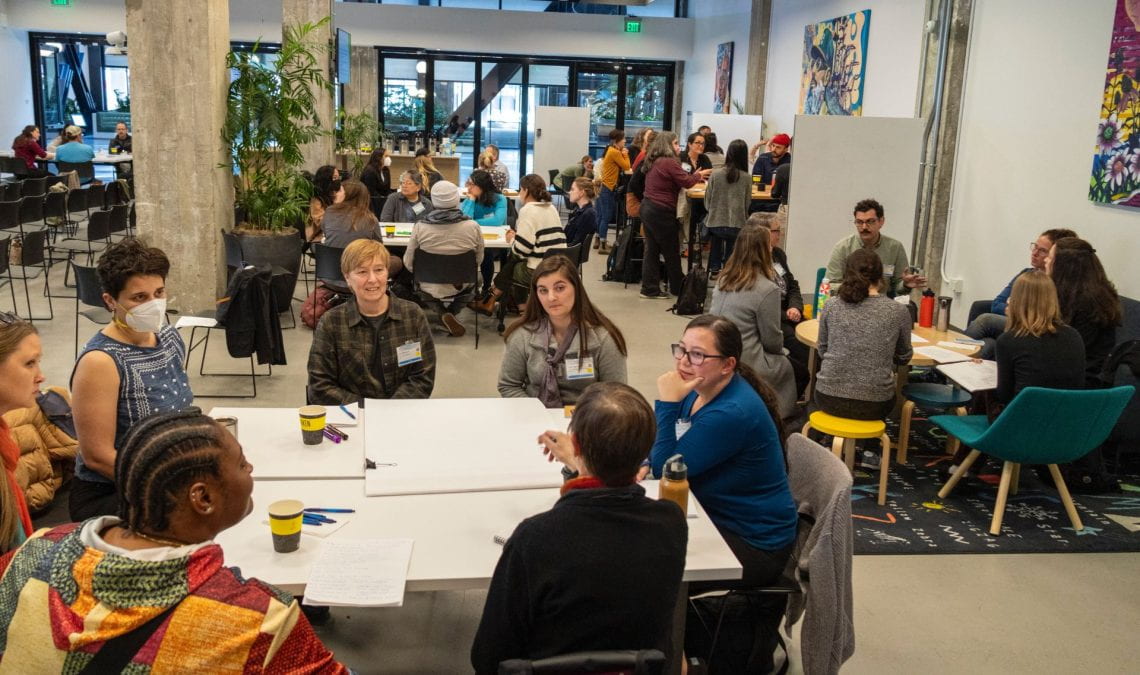An area of increasing focus in the environmental justice (EJ) movement is the need to amplify voices of underserved communities, and one way government agencies are doing this is through partnerships with community-based organizations (CBOs). A pre-conference workshop on this topic as part of the State of the Estuary conference was held in Oakland last month, titled “Environmental Justice 2.0 for the Bay-Delta Estuary: Lessons Learned from EJ Expert-Government Agency Partnerships and Models for the Future.”
(Credit: Joey Kotfica, Bay Area Metro)
One example of this type of partnership is the recent formation of an EJ Expert Group established in partnership with the Delta Stewardship Council, a California state agency with coequal goals of a more reliable statewide water supply and a healthy and protected ecosystem. This and other partnerships between government agencies and CBOs – such as the San Francisco Bay Conservation & Development Commission’s EJ Advisors Program, the Oakland Shoreline Leadership Academy, and San Francisco Estuary Partnership’s Youth Council – underscore the importance of engaging different voices in developing a range of options to address environmental justice concerns within and beyond the Sacramento-San Joaquin Delta.

(Credit: Joey Kotfica, Bay Area Metro)
We recently connected with Megan Thomson (USF MSEM ‘20), an environmental scientist with the Delta Stewardship Council, who shared additional insights into key learnings she and other members of the workshop planning team took away from the experience. The workshop planning team included environmental justice experts from Ninth Root, Build It Green, Oakland Shoreline Leadership Academy, Rise South City, Restore the Delta, and Little Manila Rising along with staff from local government agencies including the San Francisco Bay Conservation and Development Commission, San Francisco Estuary Partnership, and the Delta Stewardship Council.

environmental scientist with the Delta Stewardship Council
What are some of the challenges in forming and sustaining agency + community partnerships?
Megan: Common themes that made for productive conversation at the workshop included challenges around:
- ENGAGEMENT: In some cases, agency staff may be reluctant to move outside their comfort zone. So there’s work to do there, as communities are really looking for agencies to bridge the gap between underserved people and the projects designed to help them.
- INCLUSION: “Community leaders are tired of feeling like another checkbox,” as Julio Garcia with Rise South City put it. True partnership requires shared decision-making power based on shared information. There needs to be clear communication about how, when, and why community leaders are engaged on an agency-led project, and agencies need to consistently be responsive to the priorities of underserved communities.
- PROCESS: Understanding how government agencies work can be confusing to people not actively involved in day-to-day operations, so community groups need agency insight and guidance that helps them navigate the process and people involved in any given project.
What strategies for overcoming these challenges stand out as especially useful?
Megan: There was a lot of great discussion on this at the workshop, including strategies such as:
- AWARENESS: Clear and consistent communication is absolutely essential to effective partnerships. One of the things we heard a lot in the workshop is the importance of broad community outreach – among youth and students, at places like libraries and grocery stores, with community liaisons who can distribute information. This helps ensure more people know what’s happening, understand how they can get involved, and see progress over time.
- CONNECTION: “For us, by us – nothing about us without us” is a rallying cry for many community leaders, which can serve as a guiding principle for agency leaders seeking to solidify partnerships. We need to meet communities where they are and make it easy for more people to engage with us – whether that’s by offering multiple ways to join a meeting, providing food or childcare at that meeting, or paying people for their time spent in that meeting.
- TRANSPARENCY: Any successful partnership requires regular updates, when things are going well and when they’re not. Agencies need to stay in frequent dialogue with communities, sharing feedback on project progress, shifts in timeline or approach, and new observations or learnings. Additionally, it’s critically important to communicate in a way that’s easily understood – no acronyms, jargon-free, mainstream translation of scientific concepts.
(Credit: Joey Kotfica, Bay Area Metro)
What other ideas emerged from the conversation that can help shape community + agency collaborations in mutually beneficial ways?
Megan: The day was full of great ideas about how to move forward and create a model for the future, with a few highlights including:
- ACTIVE LISTENING: Communities should play a role in determining environmental priorities, so creating a time and place for community members to freely share their concerns with agency leaders can be an effective way to encourage engagement, prioritize actions, and establish shared goals.
- TAILORED TRAINING: Some specific skills go a long way in increasing effectiveness when working in and alongside the government, so developing training programs that help community leaders learn how to write grants or engage with the right decision maker on a particular project can be exceptionally valuable. And cultural competency training can be an effective way to help agency staff get comfortable.
- EXPANDED COMFORT ZONE: Doing things the same old way is never going to meaningfully change outcomes. So we need to get out of our comfort zones. For government agencies, within the framework of trusted partnerships, that means letting the community lead on some decisions.
Credit: Joey Kotfica, Bay Area Metro






